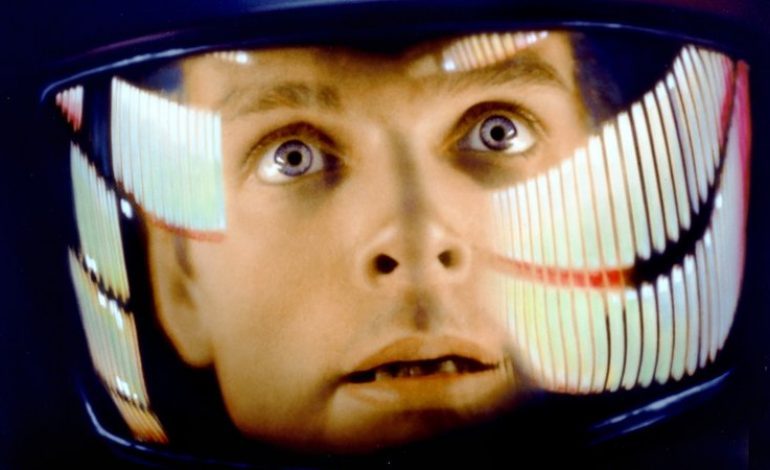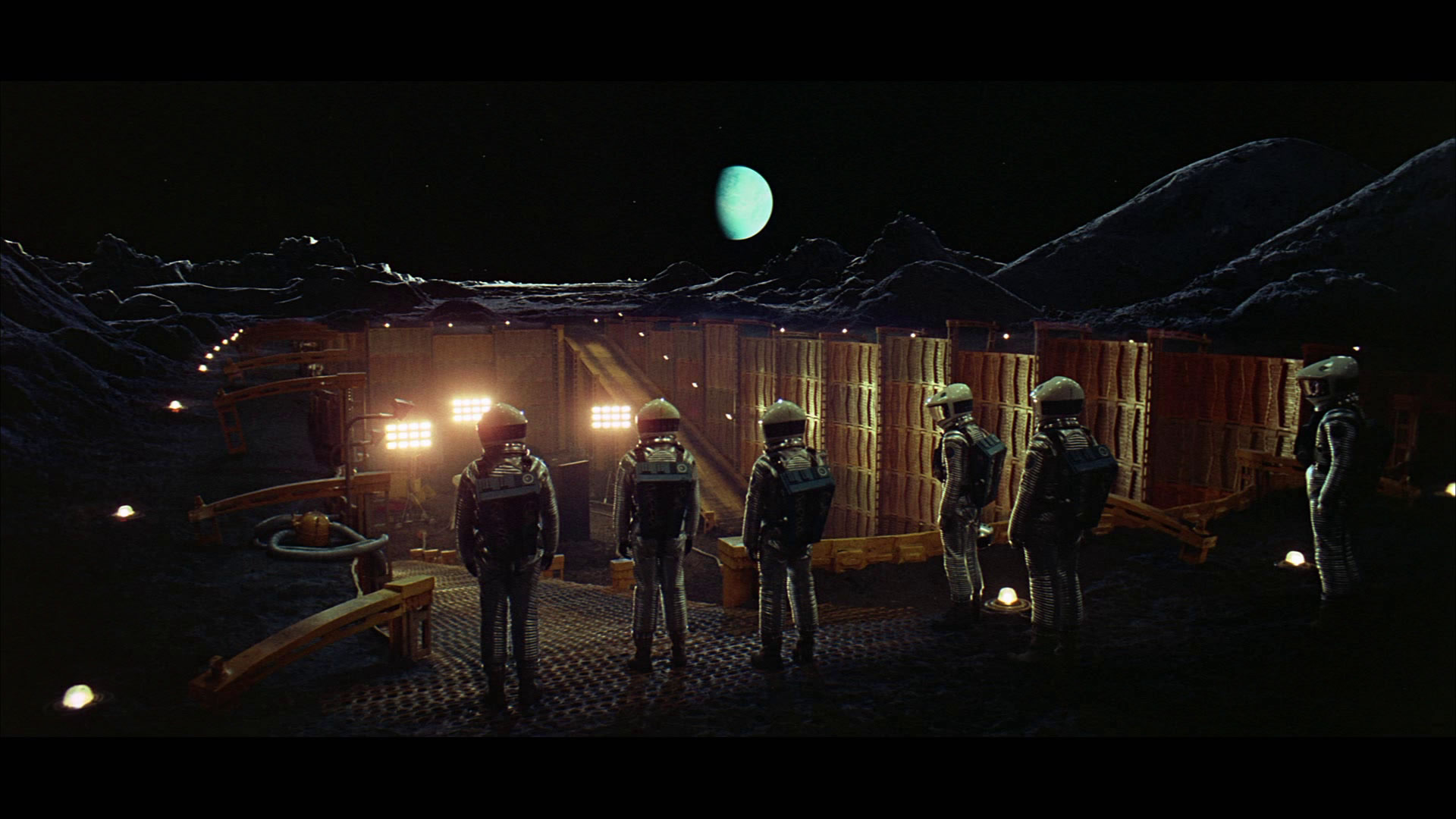

Science fiction films have been a staple of Hollywood for years, and with memorable titles like Alien, The Terminator and Star Wars, people have flocked to theaters and returned to the stories that opened the world of wonder and amazement; but, no movie is more inspirational than the one that blew open the door on the sci-fi genre: Stanley Kubrick’s 2001: A Space Odyssey. A film that has numerous ideas, mind-blowing sets, and questions of what the future holds still hits strong after fifty years! That’s right, the sci-fi epic has turned half a century old and now it’s time to go back to a time where sci-fi films weren’t an invested genre and meet up with an old partner- that is Hal 9000.
I do like science fiction films, but I believe that each of us has an idea of what science fiction is and what it is we like about them. For me, Star Wars is awesome, creative, and unique, but not a sci-fi film that I would continue to watch for years. The sci-fi that interests me are the ones built on ideas and the not the spectacle. I like to think with the movies that I watch. I don’t enjoy the tired cliché where aliens arrive and want to destroy everything in their path. Independence Day is one of the films that was cool for a few minutes but isn’t clever enough to stay in my mind, except the White House explosion scene — that was cool.
If someone were to ask me what is the one sci-fi that I would recommend people to watch, I would name two — Fritz Lang’s Metropolis and Ridley Scott’s Alien. Both films are unique and definitely stand out from anything in their genre. But Alien has one thing that is heavily inspired by 2001: A Space Odyssey –– artificial intelligence. Whenever someone references the film, it’s Hal 9000 that’s always mentioned or the famous line, “Open the pod bay doors, Hal.” Yes, those are cool moments, but after watching the film, there are some other interesting things that I noticed.
First of all, 2001: A Space Odyssey is a beautifully shot film. In fact, almost ninety minutes of the film features no dialogue (I watched the original theatrical cut and not the extended version.) It tells the story of a mysterious object that arrives on Earth during the Dawn of Man era. The opening twenty-five minutes details a tribe of great apes or hominids who encounter this object and learn something that they haven’t done before. It’s interesting to watch this unfold before the film jumps millions of years to the future where the same object has been found on the Moon.
Bear in mind, humans didn’t land on the moon until July of 1969, whereas the first spacecraft to land on the Moon was the Soviet Union’s Luna 2 in 1959. This film was released on April 3, 1968! I wonder what the audience was thinking while watching this film. This must’ve been revolutionary, especially since Star Wars wasn’t released until 1977. The plot moves along where a group of scientists go to investigate the so called “Monolith”. The film then jumps forward eighteen months where astronauts are making their way to Jupiter, the first humans to ever do so. It’s here where we meet the famous red-eye of Hal 9000.
As I said before, the film does intrigue me with its ideas, sets, costumes, lack of sound in space, and the sense of spectacle with the spaceships; something we hadn’t quite achieved yet. Here’s is what I found that made me scratch my head: the plot drags on forever and yes, I do think that the film is too long. Also, while I did enjoy the classical music that opened the film, I felt that it was overused and was starting to give me a headache as the film progressed. Also, the characters in the film are introduced enough for me to become invested in them, then the film moves along without them, leaving me to wonder what happened.
With the aforementioned films that I enjoy, I can see the inspiration for them clearly in this movie. From its unique camera angles in the Discovery One spacecraft en-route to Jupiter, to the ending which has been talked about since the film’s release, there’s a lot that any sci-fi fan can see and say, “Hey look at that, that’s been in other movies.” The best part of the film is listening to Hal 9000 speak to his crew; he strangely doesn’t sound like a computer. He has emotion, feeling, and even mentions that he’s scared at one point. The voice of Daniel Rain gives Hal 9000 an interesting persona. He plays chess, has conversations and appears to have a mind of his own.
Hal 9000 has become a famous non-human character in film history, being ranked among some of the greatest villains. The way Daniel Rain spoke and the appearance of Hal 9000 as the red-eyed machine reminded me of another artificial intelligence character in film — David from Prometheus. As I watched 2001, I imagined that if Hal 9000 were made into an android, David (Michael Fassbender) would be the person that would pop into my mind. The conversations that both Hal 9000 and David engage in with their crew somewhat mirror themselves; it was remarkable for me to imagine this.
Another thing that surprised me was the awe-inspiring visuals. If one were to look back at the history of science fiction in Hollywood, the budgets were small and a lot of the sets, costumes and designs took a back seat to everything else. It would be almost silly-looking on the screen, Kubrick invested the budget to make his film look realistic while looking great for the audience. It worked! Just look at the Moon’s set design as the scientists are making their way to the mysterious Monolith. Look at the amazing attention to detail on the spaceships that float across space. In theaters, you would be able to see several country’s flags on those ships, but sadly when watching it on your television you wouldn’t be able to spot them. Of course, we can’t forget the moment when Bowman (Keir Dullea) encounters an orbiting Monolith around Jupiter when his EVA Pod is pulled into a vortex of cosmic phenomena.
At its time of release, the initial reaction was widely mixed. Here are some quotes. The Boston Globe said the film was, “the world’s most extraordinary film.” The New Yorker said, “some kind of a great film, and an unforgettable endeavor.” The other critics including the New York Times said, “somewhere between hypnotic and immensely boring.” Variety had something interesting to say, “big, beautiful, but plodding sci-fi epic … A major achievement in cinematography and special effects, 2001 lacks dramatic appeal to a large degree and only conveys suspense after the halfway mark.”
Personally, I’m right in the middle of the critic reviews. I do believe that this is a beautiful movie with a lot of great ideas, but it’s too long and not engaging enough for the audience to recall the story as a whole. Still, I would give this movie a “thumbs up” but I would caution people to watch it on the basis of study. As an entertaining piece, I think it fails. The characters aren’t utilized enough and I hardly remember the story that much, and I just watched this yesterday. I remember the ideals more. The creepy Monolith, the spaceships and suits, the questions it posed on whether aliens exist or not, what the future will be like, and how will the future affect us? These questions would be a lot of fun to discuss with a group of students, friends, or co-workers. I wished I was born in the 1950s just so I could see this film when it was first released. I don’t know what my reaction would’ve been, but the idea itself is out of this world! The idea of space exploration was something still in the works in reality and 2001 introduced us to the possibility of alien life, artificial intelligence, a moon base, and the wonder of what is beyond our home we call Earth.
2001 is not a new thing, there have been three published sequels, a movie sequel that was released in 1984 and the film itself is still talked about fifty years later! There’s a whole list of items you can read where people closely analyze each scene in the film, the ending is always mentioned, and yes there are many questions that we want answered. Stanley Kubrick wanted the audience to decide for themselves and in response to that, I do agree with him. I like leaving the theater or turning off my television with questions floating around in my head, I believe that it engages the audience more leaving us wondering. 2001 has such big ideas that it would be nice to get some clear answers, even the book from which this was based on and written concurrently during production doesn’t provide all the answers either.
All in all, 2001 is a momentous achievement in filmmaking for the sense of style, wonder and pure imagination that was put into this project. The only thing is the film does lack in several areas. Watch this film for what it inspired and have conversations with people about it, I’m sure they will last for a while. I believe there are better sci-fi films out there, but what was introduced has made its way to reality. We have artificial intelligence (Hello Cortana), we do travel the Universe in satellites but not with humans, and the quest for alien life is still ongoing. Anyone remember the show Ancient Aliens? Yes, this film even mentions what those people claim as well.
I’m interested to dive into the novels and read about what the author, Arthur C. Clarke thought the future would be. A lot has changed since then in the world of science and movies, but 2001: A Space Odyssey is a film that will stay in 1968 because the time it was released was the best time; the same impact that Star Wars would have nine years later. It’s a wonder to experience and don’t forget to spot everything that is in this film that inspired what came years after and what will appear in the future.



